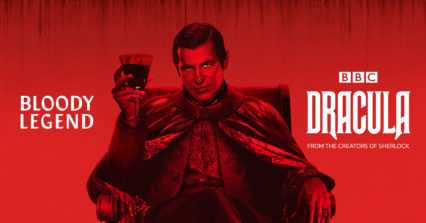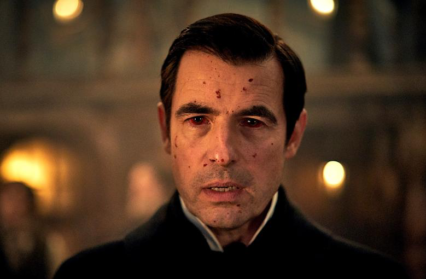Gary Raymond reviews the latest big-budget BBC/Netflix adaptation of Bram Stoker’s Dracula, a blood-soaked, fun-filled gothic nightmare from Sherlock creators Mark Gatiss and Steven Moffat.

There is a scant substitute in the adaptation of a great book for true, pure passionate adoration of the source material in the adaptors. Not simply an admiration, or even affection, but a slavish obsessional relationship that brings the writer back to their first childhood encounter with a life-changing influence. In Mark Gatiss, Bram Stoker’s Dracula has clearly mixed into his bloodstream many moons ago. When he did his very good History of Horror for the BBC in 2010, he spent a great deal of time focusing on the undead count, and particularly with Christopher Lee’s Hammer incarnation, jotting out the story of how the mesmerising world of vampires drew him in at an early age. So it would be reasonable to assume from that documentary alone that Gatiss has here in this lavish big-budget BBC/Netflix adaption his dream gig, the bucket list climax. Along with his Sherlock co-conspirator and former Dr Who overlord Steven Moffat, the two have gone Hell for leather with what will surely be one of the BBC’s most successful productions of 2020.
In Dracula, Gatiss and Moffatt have somehow resisted most of the urges that made Sherlock such an unwatchable mishmash of condescending pyrotechnics and pantomimic overacting and instead have created a grown-up thoughtful and very gory version of the epistolic classic. For some non-horror fans who may have come to this because of its BBC pedigree, or perhaps because of Gatiss’ and Moffat’s previous successful collaborations, it will undoubtedly be too much, but this is something to be applauded. The BBC needs more grown-up drama that’s not about finding a child-killer or woman-stalker. This is bold, ballsy horror. And it is always worth giving your big guns a chance to expand their repertoire. Dracula is hot ground for any viewer coming from the kid’s TV of Dr Who or coming with the attention-span deficits of Sherlock. This is a gruelling, fast-paced ride, bloody enough and sexy enough to already have some right-wing newspapers giving it hatchet reviews as they build their case for prosecution in dismantling the license fee.
Seasoned horror fans, on the other hand, will no doubt be pleasantly surprised that the mainstream has created something that understands horror so well. They will enjoy the creative takes on the tropes of the vampire fantasy. Dracula emerging from his wolven form is straight from the Cronenberg school, and the demise of Jonathan Harker is very well done. When Dracula sticks within arms reach of the original novel, it is very good. Most embellishments are welcome cinematic swerves into gothic atmospherics. The castle is the architectural creation of a crazed mind, which is just as much of an homage to Shirley Jackson than an extrapolation of anything in the novel. There’s also more than just a hint of love for Roger Corman’s Edgar Allen Poe movies of the 1960s in these sequences. When Harker comes across Dracula’s dungeon and begins popping the lids on the storage crates he finds there, what follows is a stunning nightmare of claustrophobic horror complete with some stop-motion special effects.
Where Dracula falls short is when it gets furthest from the source material. This mostly happens in the second half, when a laboured stand-off between Dracula and the inhabitants of a convent is most reminiscent of Moffat’s Dr Who set-pieces. A crack platoon of stake-wielding nuns threatens to undercut all the good work that has come before, but luckily we’re spared any Sherlock-style CGI kung fu sisters handing the Count his ass on a silver platter. (In fact, it’s tempting to speculate it’s Gatiss who was in charge of the Castle Dracula part of the story, and Moffat in the seat for the less tense, slightly silly convent part). The face-off between Dracula and occult expert Sister Agatha is overlong. And again the hangover from earlier projects of Gatiss and Moffat, where much of the pacing is down to snappy smart-mouth characters, is felt in the incessant sarcasm of Dracula and Agatha. What should have felt like a battle of good versus evil is ultimately closer to a comedy roast as the two try to out-quip each other. Claes Bang’s Dracula is menacing for the most part, but fewer jokes may have surged up the tone a bit. Likewise, Dolly Wells is excellent as Agatha, but it would have been good had more of her lines seemed less like she was reading out a series of zinger tweets.
But such is the necessity of the modern adaptation. Something must be fresh, and the energy levels must be high. If they can pull back from the self-indulgent dip in the last half hour of the opening 90-minute episode and get back to unpicking the source material with a healthy blood-soaked wit as it does here, for the most part, it will prove to be a significant contribution to the Dracula canon.
For more entertaining dramas have a look at both the BBC and Netflix website (take notice of subscription charges and TV licence fees).
Gary Raymond is an editor and regular contributor to Wales Arts Review.



 Enjoyed this article? Support our writers directly by buying them a coffee and clicking this link.
Enjoyed this article? Support our writers directly by buying them a coffee and clicking this link.








